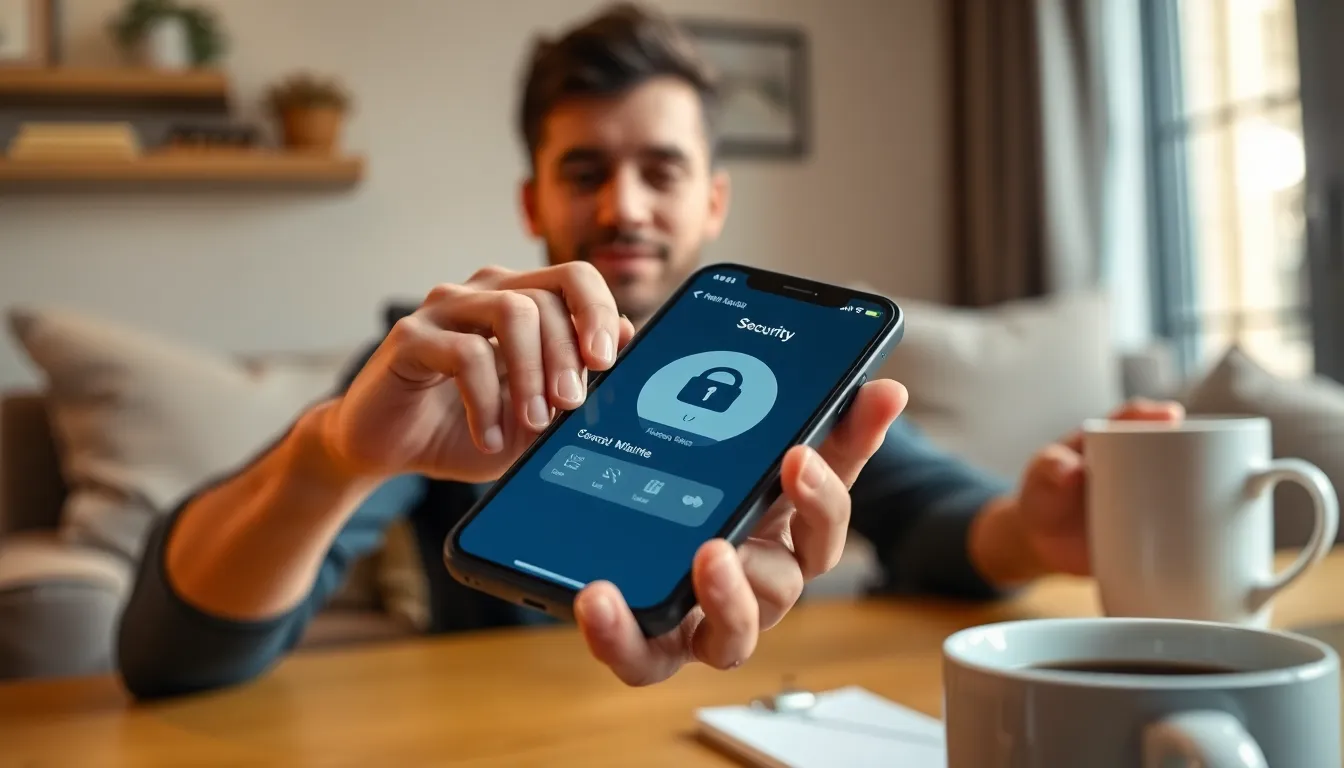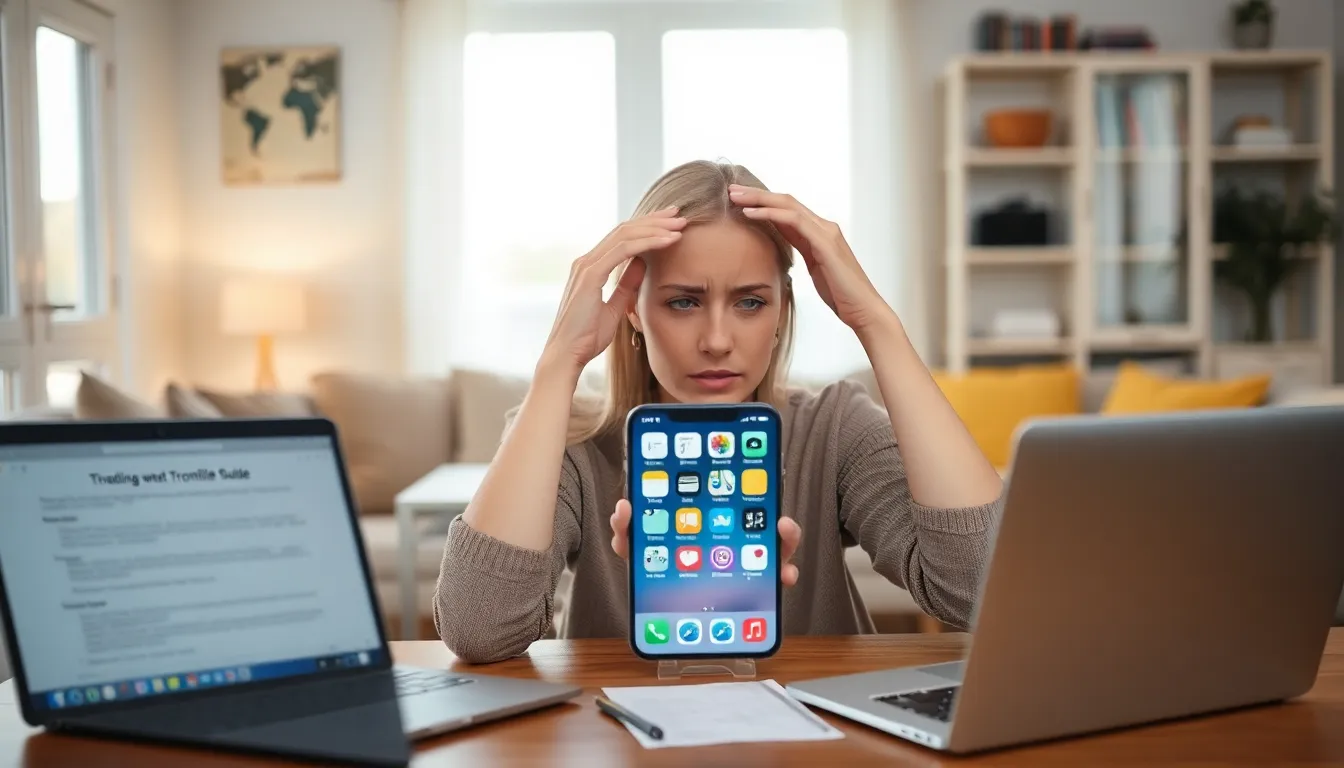Table of Contents
ToggleIs your iPhone acting more like a drama queen than a trusty sidekick? If apps are crashing and your battery’s draining faster than you can say “help,” it might be time to consider the dreaded virus. Yes, even the sleekest of devices can fall prey to pesky malware. But don’t panic! There’s a way to send that unwelcome intruder packing.
Understanding iPhone Viruses
Users often worry about viruses affecting their iPhones. Awareness of common myths and signs can help them identify and address potential issues.
Common Myths About iPhone Viruses
Many believe iPhones are immune to viruses. While iOS has robust security features, no device is entirely safe from malware. Some users think antivirus apps are unnecessary, but certain security apps can enhance protection. A common misconception is that jailbreaking the device poses no risk; however, it opens vulnerabilities that cyber threats can exploit. Others assume that if their device runs smoothly, it’s virus-free, ignoring the possibility of hidden malware.
Signs Your iPhone Might Be Infected
Unexpected app crashes frequently indicate a possible infection. Rapid battery drain may suggest the presence of malware running in the background. Unusual data usage patterns can also raise red flags. Users often notice unfamiliar apps appearing without consent, further suggesting potential issues. Pop-up ads can become intrusive, signaling a virus. Additionally, if the device becomes unresponsive, it’s wise to investigate further.
Steps to Remove Viruses from Your iPhone

Removing viruses from an iPhone requires targeted actions. Users facing unusual behavior on their devices can follow these straightforward steps to restore their device’s performance.
Restarting Your iPhone
Restarting an iPhone often clears temporary glitches. Simple actions like holding down the power button prompt the device to turn off. After waiting a few seconds, powering it back on can resolve minor issues. This process also refreshes system resources, reducing the effects of any potential malware.
Updating Your iOS
Keeping iOS updated plays a vital role in security. Apple frequently releases updates that fix vulnerabilities and improve overall stability. Users can check for updates by navigating to Settings, then General, and selecting Software Update. Installing the latest version strengthens the security framework, making devices less susceptible to viruses.
Using Antivirus Software
Antivirus software can enhance device security. Although iOS is inherently secure, some antivirus apps provide an additional layer of protection. Users interested in this option should research reputable apps that focus on iOS security. Proper antivirus solutions can detect and remove malware while ensuring user data remains safe.
Preventing Future Infections
Staying proactive keeps an iPhone secure from future infections. Implementing best practices enhances device safety and minimizes risks.
Best Practices for iPhone Security
Keeping software updated is crucial for security. Regularly use the latest iOS versions to bolster defenses against vulnerabilities. Enable automatic updates to ensure timely security patches. Utilize strong passwords and consider two-factor authentication, adding an extra layer of protection. Download apps only from the App Store to reduce exposure to malware. Monitoring app permissions helps maintain privacy, revealing which apps access sensitive information.
Regular Maintenance Tips
Conducting regular device checks ensures optimal performance. Clearing cache and unused apps frees storage and reduces complications. Periodically reviewing app behavior alerts users to unusual data usage. Backup data frequently to iCloud or iTunes, safeguarding important files against loss. Adjusting privacy settings allows users to control how apps interact with personal information. Restarting the iPhone weekly can resolve minor glitches and improve responsiveness.
When to Seek Professional Help
Individuals should consider professional assistance when unusual behavior persists despite troubleshooting efforts. Persistent app crashes and unexpected system slowdowns often signal deeper issues. Users experiencing significant battery drains or rapid overheating might also face underlying malware.
It’s crucial to seek help if unfamiliar apps appear suddenly on the device. App installation not initiated by the user raises red flags that professionals can effectively address. When intrusive pop-up ads become frequent, they indicate potential malware that may require expert intervention to eliminate.
In cases of extensive data usage beyond normal limits, the situation warrants immediate attention. High data consumption without clear reasons often suggests compromised security. Users noticing unresponsive behavior, even after attempts to resolve it, should promptly consult experts.
Professional help becomes essential when initial steps fail to restore normal functionality. Experts have access to advanced tools and knowledge, making them better equipped to handle severe issues. Seeking assistance through authorized Apple service providers ensures a reliable evaluation and effective resolution.
Finally, when device security seems compromised or if there’s uncertainty about the steps taken, professional guidance is invaluable. Experts can provide tailored advice, including whether additional protective measures are needed to safeguard the device from potential threats.
Taking proactive steps to eliminate viruses from an iPhone is crucial for maintaining its performance and security. Users should remain vigilant and recognize the signs of potential malware to address issues promptly. By following the recommended steps such as restarting the device updating iOS and utilizing reputable antivirus software users can significantly reduce risks.
Implementing best practices like downloading apps only from the App Store and enabling two-factor authentication further strengthens device security. Regular maintenance and monitoring are essential for ensuring long-term protection against malware threats. If problems persist despite these efforts seeking professional help can provide the necessary support for thorough resolution. Keeping iPhones secure not only enhances user experience but also safeguards personal information from potential threats.




